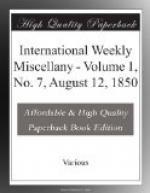The scholastic education of the young man who was to inherit this considerable fortune, was nearly completed during the reign of Louis XVIII., and shortly after Charles X. ascended the throne il commencait a faire sur droit, as they phrase it in the pays Latin. Neither during the reign of Louis XVIII., nor indeed now, unless in the exact and physical sciences, does Paris afford a very solid and substantial education. Though the Roman poets and historians are tolerably well studied and taught, yet little attention is paid to Greek literature. The physical and exact sciences are unquestionably admirably taught at the Polytechnique and other schools; but neither at the College of St. Barbe, nor of Henry IV., can a pupil be so well grounded in the rudiments and humanities as in our grammar and public schools. A studious, pains-taking, and docile youth, will, no doubt, learn a great deal, no matter where he has been placed in pupilage; but we have heard from a contemporary of M. Rollin, that he was not particularly distinguished either for his industry or his docility in early life. The earliest days of the reign of Charles X. saw M. Ledru Rollin an etudiant en droit in Paris. Though the schools of law had been re-established during the Consulate pretty much after the fashion in which they existed in the time of Louis the XIV., yet the application of the alumni was fitful and desultory, and perhaps there were no two classes in France, at the commencement of 1825. who were more imbued with the Voltarian philosophy and the doctrines and principles of Rousseau, than the eleves of the schools of law and medicine.
Under a king so sceptical and voluptuous, so much of a philosophie and phyrroneste, as Louis XVIII., such tendencies were likely to spread themselves through all ranks of society—to permeate from the very highest to the very lowest classes: and not all the lately acquired asceticism of the monarch, his successor, nor all the efforts of the Jesuits could restrain or control the tendencies of the etudiants en droit. What the law-students were antecedently and subsequent to 1825, we know from the Physiologie de l’Homme de Loi; and it is not to be supposed that M. Ledru Rollin, with more ample pecuniary means at command, very much differed from his fellows. After undergoing a three years’ course of study, M. Rollin obtained a diploma as a licencie en droit, and commenced his career as stagiare somewhere about the end of 1826 or the beginning of 1827. Toward the close of 1829, or in the first months of 1830, he was, we believe, placed on the roll of advocates; so that he was called to the bar, or, as they say in France, received an advocate, in his twenty-second or twenty-third year.




